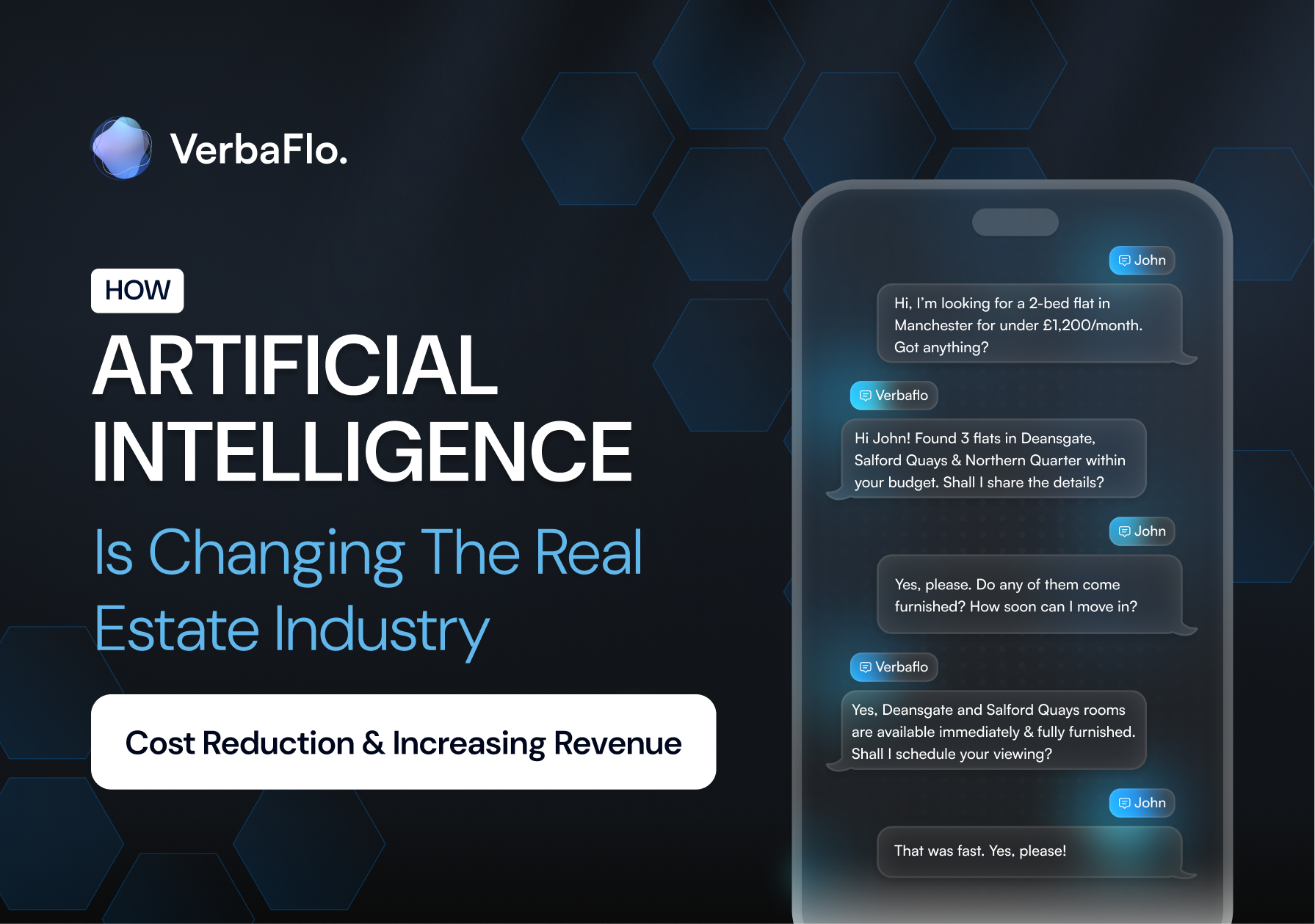How artificial intelligence is changing the real estate industry cost reduction & increasing revenue?
Artificial Intelligence is transforming real estate by automating manual workflows, cutting operational costs, and unlocking new revenue streams. From lead scoring and lease abstraction to virtual staging and dynamic pricing, AI tools are driving smarter, faster decisions. Real-world solutions like VerbaFlo campaigns and chatbots are already enhancing engagement and ROI. As AI adoption grows, firms that move early will gain a decisive edge in profitability and performance.


Artificial intelligence is rapidly changing and the real estate sector, changing how properties are marketed, managed, and sold in the modern world. Tools like predictive analytics, virtual viewings, and automated management platforms are enabling firms to make smarter, data-driven decisions. These technologies reduce operational costs by automating time-consuming tasks and streamlining workflows.
At the same time, they drive revenue through improved customer interactions and better market predictions. With the global AI in the real estate market expected to grow from $2.9 billion in 2024 to $41.5 billion by 2033, the technology is becoming a key driver of profitability and competitive advantage across the industry.
What AI Technologies Are Being Used in Real Estate Today?
AI is helping real estate firms cut costs and generate revenue by automating tasks and improving decisions. Below is a simple breakdown of five core AI technology in real estate.
| AI Technology | How It Works | Real Estate Example |
|---|---|---|
| Machine Learning (ML) | Analyzes past data to predict future outcomes. | Platforms use ML to estimate home prices instantly, reducing time and marketing costs |
| Natural Language Processing (NLP) | Reads and writes human language. | Conversational AI answers tenant queries 24/7 and tools auto-generate listing descriptions from property specifications |
| Generative AI | Creates new text, images or layouts from prompts and data. | It produces listing copy, virtual staging visuals, and client-ready ads, thereby, saving content costs and boosting leads |
| Reinforcement Learning & Decision Trees | Uses trial-and-error and if-then rules to guide choices. | Models simulate investment scenarios or use decision logic (e.g. decision trees) to help choose high-yield property strategies. |
How AI Cuts Costs in Real Estate?
Real estate firms face heavy expenses in areas like marketing, lease processing, staging, and lead follow-up (more like Sales). AI tools reduce labor, speed up tasks, and trim error-related losses, delivering clear dollar savings.
Below is a side-by-side comparison of typical manual costs versus AI-powered alternatives.
| Task Area | Traditional (Manual Cost Per Year) | With AI (Cost per Year) | Example & Source |
|---|---|---|---|
| Lead Engagement & Follow-Up | Hiring an inside sales agent or receptionist: $48K–$60K/year, plus risk of lost leads worth $240K/year from slow response. | AI calling agent costs ~$5K–$10K/year and converts more leads, saving up to $40K/year in agent cost alone. | AI calling agents take care of redundant queries, reducing miss-outs. Savings from fewer missed deals and labour can focus on high importance tasks. |
| Property Staging (Marketing) | Traditional staging costs $1,500–$4,000 per property, or manual virtual staging costs ~$30/image (e.g. $300 per 10 photos). | AI virtual staging costs as little as $2/image – 90% cost reduction | AI virtual staging platforms charge only $1.75–$3 per image vs. ~$30 manual. Big savings per listing |
| Operational & Administrative Tasks | Manual data entry, scheduling, valuation and maintenance tracking – staff cost $200K+ per firm annually. | AI automation handles documents, predictive maintenance scheduling – automation of ~37% of tasks; saving up to $75K/year. | Morgan Stanley projects: 37% of tasks automatable, translating into $34B industry-wide savings and major cost reduction. |
| Valuation & Pricing Modelling | Manual comps research and valuation is labor-intensive; staff time ~$60K/year with limited speed/accuracy. | ML-based pricing models generate instant, precise valuations—reducing costs and error-related inefficiencies. | AI valuation improves accuracy and cuts manual workload and errors. |
Admin and Repetitive Task Automation
Real estate firms spend a lot of time and money on routine tasks, like rent reminders, lead sorting, lease renewals, scheduling, and basic tenant support. AI automates these workflows across platforms like CRM systems and property tech solutions. That leads to fewer mistakes, faster responses, and meaningful staff cost savings.
A real life example would be VerbaFlo Campaigns.
Built to reduce the burden of manual outreach and repetitive follow-ups, this feature allows real estate teams to launch automated, AI-powered campaigns across email, WhatsApp, and call (voice) ; all from one unified platform. Whether it’s nurturing unresponsive leads, sending rent reminders, or re-engaging past prospects, VerbaFlo Campaigns ensures every touchpoint is timely, personalised, and tracked. By automating these repetitive tasks, teams can focus their time on high-value conversations while still maintaining consistent lead engagement at scale.
Read More Here: Campaigns By VerbaFlo
AI in Lease Abstraction & Document Management
Commercial real estate firms now rely on AI tools to automatically extract critical information from lease agreements; sometimes in under 7 minutes, versus 4–8 hours manually. NLP and machine learning models scan leases to identify dates, rent amounts, clauses, and renewal terms, structuring this data into searchable dashboards for legal, finance, and real estate teams.
Below is a table showing how major tools automatically identify lease specifics:
| Key Term | What AI Extracts |
|---|---|
| Lease expiry & renewal dates | Start, end, expansion options, renewal deadlines |
| Payment cycles & escalations | Base rent, CAM charges, escalation schedules |
| Penalty & termination clauses | Late fees, termination rights, indemnity clauses |
By implementing AI lease abstraction tools, firms benefit in multiple ways:
- Reduced legal risk: Automated extraction offers higher accuracy, catching unfavorable clauses or compliance gaps before deal signing or audits. Real-time risk flags alert teams to potential liabilities in liabilities or legality, minimizing exposure.
- Lower paralegal and legal workload: Instead of reading every clause manually, paralegals can review and verify AI outputs. This frees their time for complex legal analysis rather than contract data entry or basic abstraction. Efficiency gains reduce staffing costs substantially.
- Faster document turnaround: AI platforms handle bulk leasing portfolios with speed, abstracting hundreds or thousands of leases in hours rather than days, keeping projects moving and decisions informed.
- Standardised, searchable lease repository: Lease data becomes structured and standardized across portfolios. Teams can query specifics instantly, supporting finance, compliance, and portfolio analysis.
AI in Property Management
AI-powered chatbots like VerbaChat handle tenant inquiries round the clock. They answer FAQs, answer complex queris, and auto-generate responses instantly. These tools reduce wait times and relieve teams from routine messages, enhancing tenant satisfaction and streamlining communication workflows.
AI tools also monitor tenant behavior to predict churn risk. Models analyze patterns such as frequency of maintenance requests, payment timeliness, lease renewal behavior, and overall engagement. They then assign a churn probability score, helping firms proactively reach out to tenants at risk of leaving.
Here’s a real-world illustration:
- If a tenant submits maintenance tickets unusually often, say three or more within a short period, AI flags this pattern as potential dissatisfaction.
- The system triggers an alert to management, prompting outreach to resolve concerns before the issue escalates.
- This early intervention helps retain tenants and saves costs associated with vacancy and turnover.
How AI Helps Real Estate Firms Earn More?
AI isn’t just cutting costs; it’s giving way to more new revenue streams. By getting into real-time data, predictive models, personalised outreach, and automated valuation, real estate companies attract higher-quality leads, close deals faster, and optimise investments. That means smarter growth and bigger profits.
| Revenue Driver | AI Use Case | Real-World Benefit |
|---|---|---|
| Smart Lead Generation & Scoring | AI tools analyse chats and queries and qualifies high intent leads. | Agents prioritise leads most likely to convert, increasing conversion rates and reducing wasted marketing spend |
| Hyper-Personalised Recommendations | Platforms like VerbaFlo conversational AI chat uses the tenant preferences and recommends property that suits them the best. | Improves engagement and conversion by matching clients with relevant properties swiftly |
| AI-Driven Marketing & Content Creation | Generative AI creates targeted ads, listing descriptions, and staging visuals at scale. | Marketing becomes faster and more compelling, generating more inquiries and reducing content creation costs |
| Pricing & Valuation Models | Dynamic pricing tools analyse comparable sales, economic trends, and local demand. | Firms achieve precise pricing, maximising returns and closing deals faster through data-backed valuation |
| Portfolio Optimisation for Investors | AI platforms analyse rent dynamics, tenant risk, and regional forecasts across assets. | Investors optimise their holdings by reallocating capital toward higher-yielding properties and avoiding underperformers |
Getting Started with AI in Real Estate: A Practical Roadmap
Integrating AI into real estate doesn’t happen overnight; it requires clarity, focus, and a step-by-step approach. The roadmap below helps firms start small, prove impact, and scale thoughtfully for maximum value.
| Step | Objective | Example Actions |
|---|---|---|
| Identify Inefficiencies | Pinpoint areas where manual work drags operations. | Audit tasks like lease abstraction, lead scoring, rent reminders or maintenance management. |
| Choose Easy-to-Deploy Tools | Select low-risk, high-impact AI options first which are more like plug-and-play. | Implement chatbots, valuation engines or virtual staging tools. |
| Train Your Team | Equip staff with skills and context to use AI effectively. | Offer training sessions, run mock deployments, and define user guidelines. |
| Start Small & Track ROI | Run pilots, measure results, and iterate before scaling. | Launch AI in one business function, measure cost/time savings, then expand. |
Conclusion: The Inevitable Evolution
AI in real estate is not here to replace agents; it's here to empower them. With AI handling lead scoring, valuation, common queries, and content, agents can focus on building relationships and closing deals. Real estate firms that adopt AI tools now will handily emerge as leaders within three to five years.
According to a Morgan Stanley survey nearly 37% of commercial real estate tasks are automatable, leading early adopters to outperform peers in earnings and execution efficiency.
In contrast, those slow to embrace AI risk being left behind. Looking ahead, the industry will clearly split between tech-powered agents and those stuck using outdated methods.
Ready to hear it for yourself?
Get a personalized demo to learn how VerbaFlo can help you drive measurable business value.
You may also like
Ready to hear it for yourself?
Get a personalized demo to learn how VerbaFlo can help you drive measurable business value.


.png)
